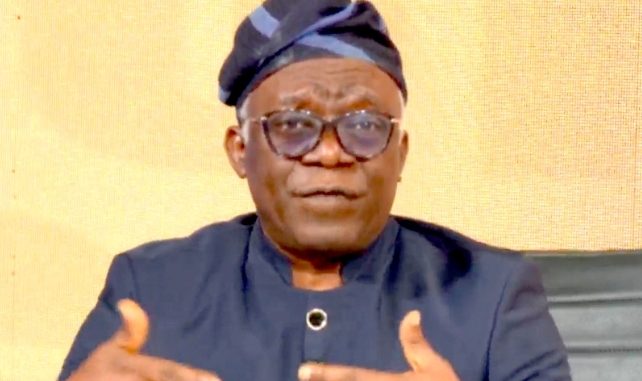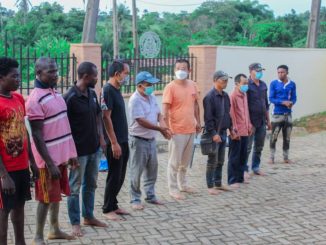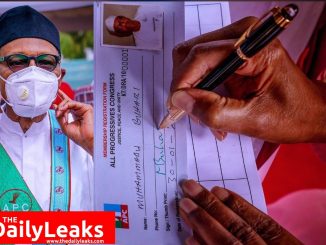
• Stresses need for constitutional governance oversight in state policing
By Emmanuel Babafemi
As the nation grapples with the contentious issue of state police implementation, human rights lawyer Femi Falana has issued a stark cautionary note, highlighting the ominous spectre of potential abuse by state governors.
The distinguished Senior Advocate of Nigeria (SAN), Falana, voiced his apprehensions as a guest on Channels Television’s Inside Sources with Laolu Akande, aired on Friday, April 5, 2024, urging for greater caution in the implementation of state police initiatives.
He underscores the importance of upholding constitutional provisions and ensuring robust governance oversight to prevent abuse of policing powers.
Falana’s pointed remarks inject a fresh wave of controversy into the debate, underscoring the urgent need for robust legal frameworks to prevent the misuse of policing powers for political gain.
The concerns of the renowned lawyer are deeply rooted in the current state of policing in the country, where private security outfits proliferate in residential areas and communities, often armed with varying degrees of weaponry.
Against this backdrop, the prospect of granting governors direct control over law enforcement agencies raises troubling questions about accountability and checks on power.
Falana draws attention to Section 216 of the Constitution, highlighting the role of the Nigeria Police Council in overseeing key appointments and decisions within law enforcement agencies.
However, he lamented the Council’s lack of meaningful engagement, calling for a return to constitutional provisions and robust policy discussions to ensure transparent and accountable governance.
The spectre of abuse looms large, casting a shadow over the aspirations for enhanced security and law enforcement. Yet, proponents of state police argue that decentralization is the key to addressing the nation’s diverse security challenges effectively.
Governorships such as the Civilian Joint Task Force in Borno State and the Amotekun Corps in the South-West geopolitical zone have demonstrated initial promise, albeit with limitations in operations and oversight.
President Bola Tinubu and governors of the 36 states have signalled their support for state police as a viable strategy to tackle the escalating security challenges.
ALSO READ: Akande calls on president to address police intimidation of FIJ amid customs smuggling allegations
Sixteen governors have already submitted reports expressing backing for state police and constitutional amendments to enable its establishment, while the stance of the remaining 20 governors remains pending.
As Nigeria stands at the crossroads of policing reform, Falana’s impassioned plea serves as a poignant reminder of the stakes at hand.
The nation must navigate the delicate balance between security and civil liberties, ensuring that the instruments of protection do not become tools of oppression in the wrong hands.
Matters arising
Falana Advocates for People-Centric State Police Implementation
Amidst the discourse on state police, Femi Falana emphasizes the importance of ensuring that state police services prioritize serving the people rather than serving the interests of the government. Falana’s advocacy for a people-centric approach underscores the need for state police forces to be accountable to the communities they serve.
—
Constitutional Provisions and Governance Oversight in Policing
Falana draws attention to Section 216 of the Constitution, highlighting the role of the Nigeria Police Council in overseeing key appointments and decisions within law enforcement agencies. He underscores the importance of upholding constitutional provisions and ensuring robust governance oversight to prevent abuse of policing powers.
—
Challenges and Potential of Existing State-Owned Security Outfits
Despite the presence of state-owned security outfits in various states, such as the Civilian Joint Task Force and the Amotekun Corps, these initiatives face operational challenges, including limitations in weaponry and legal authority. Governors express optimism that with constitutional backing, these outfits can fulfil their potential in addressing security challenges.
—
Support for State Police as a Solution to Rising Insecurity
Governors and socio-political groups advocate for state police as a solution to rising insecurity, citing the need for localized law enforcement efforts to combat threats such as kidnapping and banditry. The endorsement of state police by President Bola Tinubu and the agreement of 16 governors highlight the growing consensus on the need for decentralized policing.
—
Legal Safeguards and Jurisdictional Definitions in State Police Implementation
Falana emphasizes the necessity of establishing clear legal safeguards and defining jurisdictional boundaries to prevent conflicts and abuses of power within state police forces. He calls for careful consideration and policy refinement to ensure that state police services uphold the rule of law and protect citizens’ rights.
—
Concerns Over Potential Misuse of State Police Powers by Governors
Falana’s warning about the potential misuse of state police powers by governors sparks debate and scrutiny over the implications of granting governors direct control over law enforcement agencies. The need for accountability mechanisms and checks on gubernatorial authority becomes a focal point in discussions surrounding state police implementation.
—
Support for Constitutional Amendments to Enable State Police Establishment
The submission of reports by 16 governors expressing support for state police and constitutional amendments underscores the momentum behind policing reform efforts. However, the stance of the remaining 20 governors remains pending, highlighting the ongoing deliberations and complexities involved in restructuring law enforcement.
—
Public Discourse on State Police and Its Implications for National Security
Social commentaries on state police continue to dominate public discourse, with stakeholders weighing the potential benefits and risks of decentralizing law enforcement. The implications for national security and governance structures remain key considerations in shaping policy decisions regarding state police implementation.
—
Operational Challenges Facing Existing State-Owned Security Outfits
State-owned security outfits face operational challenges, including limitations in weaponry and legal authority, hampering their effectiveness in addressing security threats. The need for constitutional backing and enhanced operational capabilities becomes apparent in discussions surrounding the potential of state police.
—
Governors’ Optimism and Commitment to Addressing Security Challenges
Despite challenges, governors express optimism and commitment to addressing security challenges through initiatives such as state police. The agreement of President Bola Tinubu and governors of the 36 states reflects a collective determination to explore decentralized policing as a viable strategy for enhancing security and maintaining law and order.
—
Role of Civil Society in Advocating for Transparent and Accountable Policing
Civil society organizations play a crucial role in advocating for transparent and accountable policing, holding policymakers and law enforcement agencies accountable for upholding the rule of law and protecting citizens’ rights. Falana’s advocacy underscores the importance of civil society engagement in shaping policing policies and practices.
—
The Need for Public Engagement and Consultation in Policymaking
The imperative of public engagement and consultation becomes apparent in shaping policing policies and practices. Falana’s call for transparent and inclusive policymaking processes reflects the importance of soliciting diverse perspectives and ensuring that citizens’ voices are heard in decisions affecting their safety and security.
—
The Way Forward: Balancing Security Imperatives with Civil Liberties
As Nigeria navigates the complexities of policing reform, striking a balance between security imperatives and civil liberties emerges as a paramount challenge. The need for comprehensive legal frameworks, robust governance oversight, and public accountability mechanisms becomes essential in safeguarding citizens’ rights while effectively addressing security threats.




